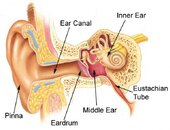Like it says in the title...
I'm a beginning diver, currently on my PADI OWD course. I've completed all my pool dives and I'm ready to hit the open water. However I have a nagging problem that has kept me from going underwater again (at least mentally).
Two weeks back I had a pool dive. Everything went well and my ears equalized just fine. Then there was the free dive part where I'd make a few dives to the bottom of the pool without scuba gear. At one dive I didn't quite equalize well and had some pain in my left ear and turned back to the surface. The ear felt a bit weird but nothing else happened. I went home and slept, the next day I had a headache, aching left ear and a slight feeling of vertigo. Painkillers helped but the slight vertigo didn't go away. Two days later the feeling was slowly fading away but I decided to go see a doctor to make sure all was ok with my ears. The doctor (a generalist) didn't see anything wrong and suggested that the feeling should go away on its own like it was already going. Two days later after that the feeling was gone and I went in for another pool dive. This time I had no problems equalizing and everything felt good. However the next day, the same thing happened. Slight headache accompanied with a slight, but noticeable feeling of vertigo with the left ear not feeling completely right. Once again I did the same thing, waited for a while and as the feeling was going away slowly, I went to see an ENT (specialized in military aviation). He inspected my ears and all airways quite thoroughly and said that everything looked fine, however he could of course not see into the inner ear. He prescribed me some anti-histamines to ensure my airways stayed clear and said he did not see any reason to stop diving. Now 3 days later the feeling of vertigo is still present, although it's quite slight but it's still there. Then there's a little feeling of drowsiness which may or may not be related.
So the question is, what's going on in my ears/head?
Reading similar cases the symptoms would point to inner ear infection. I'm just not sure. I'm also a bit conflicted with whether I should dive or not. Physical activities aren't an issue I've noticed, in fact exercising makes me feel better. Any suggestions, experiences, wisdom on the issue?
I'm a beginning diver, currently on my PADI OWD course. I've completed all my pool dives and I'm ready to hit the open water. However I have a nagging problem that has kept me from going underwater again (at least mentally).
Two weeks back I had a pool dive. Everything went well and my ears equalized just fine. Then there was the free dive part where I'd make a few dives to the bottom of the pool without scuba gear. At one dive I didn't quite equalize well and had some pain in my left ear and turned back to the surface. The ear felt a bit weird but nothing else happened. I went home and slept, the next day I had a headache, aching left ear and a slight feeling of vertigo. Painkillers helped but the slight vertigo didn't go away. Two days later the feeling was slowly fading away but I decided to go see a doctor to make sure all was ok with my ears. The doctor (a generalist) didn't see anything wrong and suggested that the feeling should go away on its own like it was already going. Two days later after that the feeling was gone and I went in for another pool dive. This time I had no problems equalizing and everything felt good. However the next day, the same thing happened. Slight headache accompanied with a slight, but noticeable feeling of vertigo with the left ear not feeling completely right. Once again I did the same thing, waited for a while and as the feeling was going away slowly, I went to see an ENT (specialized in military aviation). He inspected my ears and all airways quite thoroughly and said that everything looked fine, however he could of course not see into the inner ear. He prescribed me some anti-histamines to ensure my airways stayed clear and said he did not see any reason to stop diving. Now 3 days later the feeling of vertigo is still present, although it's quite slight but it's still there. Then there's a little feeling of drowsiness which may or may not be related.
So the question is, what's going on in my ears/head?
Reading similar cases the symptoms would point to inner ear infection. I'm just not sure. I'm also a bit conflicted with whether I should dive or not. Physical activities aren't an issue I've noticed, in fact exercising makes me feel better. Any suggestions, experiences, wisdom on the issue?




